Your grandmother’s knitwear and a simple unisex suit isn’t a typical combination, but fashion designers Flaka Jahaj and Bonne Reijn have combined forces to produce exactly that. Their collaboration, “Iahai International invites Amsterdam Friends,” will be launched today at their new pop-up store at the Passenger Gallery in Prishtina.
Jahaj, the Kosovar-Swiss designer who is rising to prominence in the fashion world of Switzerland having won the the prestigious Swiss Design Award in 2014, has already made handcrafted knitwear created in her artisanal atelier in Prishtina her trademark. In 2015, she launched her women’s knitwear label ‘Iahai’ based in Zurich.
Jahaj’s designs usually have an element of multifunctionality; a skirt can also be used as a jumper or a dress. “If it is handmade, it is a lot of effort, a lot of work, so I say why not push it a little further so you can multiuse it,” she explains.
Her collaborator and friend is Bonne Reijn from Amsterdam. In early 2014, Reijn designed a batch of black and white two-piece suits, and labeled them BONNE. He felt “compelled to create something that would be oblivious to any occasion, sex, age, or social expectation, something that would be a key piece in anyone’s life and wardrobe, suitable for informal and formal occasions, and with long lasting quality,” or so reads the description on his website.
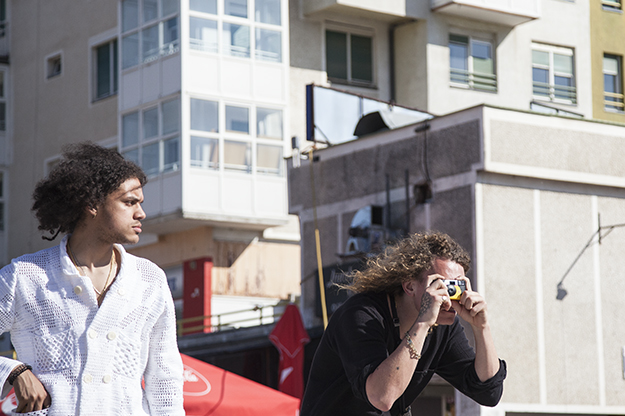
As well as exhibiting their work, Jahaj, Reijn and two friends are capturing their trip to Kosovo through disposable cameras. Photo: Majlinda Hoxha / K2.0.
Reijn has brought two friends to Prishtina, who, alongside Jahaj and Reijn will be documenting both the collaboration and some of the Kosovar women who inspired it through disposable cameras. The results will be exhibited alongside another exhibition of the pair’s work in Los Angeles, giving a glimpse of Kosovo.
Just before one of their photo shoots on Wednesday, K2.0 sat down with Jahaj and Reijn to discuss Flaka’s knitwear, Bonne’s suits and how they hope to help cure some of the wrongs of the fashion industry.
K2.0: Is this the first presentation of your work in Kosovo?
Flaka Jahaj (FJ): For me, it is the first time hosting a presentation in Kosovo and I’m really happy I am not doing it by myself, because I can share a bit of the pressure. I have beautiful support here from Amsterdam, and I am very much into the exchange thing.
I think Kosovo is really closed up. As Albanians coming back [to Kosovo] is cool and you can be famous for five minutes, but it is really nice if you have people like Bonne and his friends who maybe never thought of coming to Kosovo. They can experience something and Kosovo can have a little window opening towards what is happening outside.
Can you explain further the nature of your collaboration?
FJ: Today, we are exposing our collaboration, a special edition of one of Bonne’s suits which incorporates my handcrafted textile designs. The suits are going to have several styles, with different elements of traditional handwork by women of Kosovo and elements of woven fabrics and crochet, all mixed differently in the archetype of Bonne’s suits.
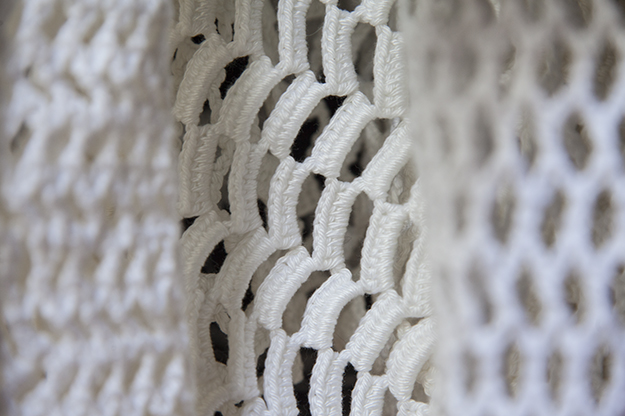
The garments are a synthesis of the two designers work, with Jahaj’s textures meeting Reijn’s shapes. Photo: Majlinda Hoxha / K2.0.
Bonne Reijn (BR): The [archetype of my] suits are just two cotton pieces, like a worker’s suit. I thought of the idea because I wanted to go back to the zero point in fashion. Everybody wearing the same, like a school uniform. I think fashion has been blown out of proportions, culturally and environmentally and I am trying to slowly get people to go back to simple dress, and wear just one thing.
Are you referring to the fashion industry’s negative impact on the environment?
BR: It is the biggest polluting industry in the world. So it is really bad.
FJ: It has also got to the point where slavery is normal. Just what was called slavery is now called an internship. Production wise, all the processes and all the different steps involved cannot be followed up anymore; where they are from, who made it and in what kind of conditions, with which material, what kind of pesticides they use etc.
It has got completely out of hand — the luxury labels are more and more expensive and the cheap labour is cheaper and cheaper. Somewhere in between someone needs to pay, and it is not definitely the developed world that pays for these kind of things, so it is the poor countries. They need to back it up for us, so we are able to live that lifestyle.
I am questioning that a lot and going against it. I do it my own way with handmade stuff, slowing down that quick process. What I realized is that people don’t know anything about quality anymore, or about tradition. They don’t know where things are from, or how they are made and it would be a shame and a big loss if that continued. Sometimes it is good to stop and look back a little bit, or around you and see how you can change it.
There is an increased number of people that refuse to buy from fashion brands because of exploitation of the workforce and the environment. Do you follow this pattern?
BR: Because I started my own brand and because I work in fashion I have the luxury to not really have to buy clothes, so I am not saying I am a super conscious guy or something. But it is good to set up stuff that can change how people view things, and that is what I am trying to do with Bonne suits and Flaka is the same [with her work].
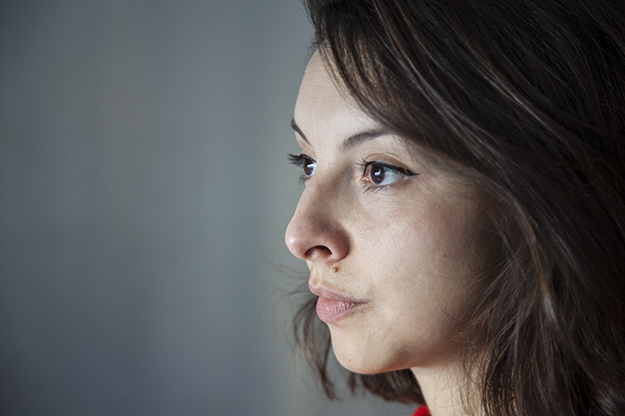
Flaka Jahaj tries to be both a conscious shopper and designer, rejecting the waste and exploitation in the fashion industry. Photo: Majlinda Hoxha / K2.0.
FJ: I try to be as conscious as possible. I know a lot about fashion, and the more you know, the more you just can’t participate in the system. To me, it is absolutely a no go to buy stuff that has a price that you know is impossible, when you know someone just got screwed over.
I reached a certain age and a certain intelligence, and I know how to reconsider certain things and question if I really want to buy something and put that on top of me. I think my conscience at this time is more important than my fashion statements, and I try to buy less and I try to use it more. I try to wear my own stuff but I have a big issue with that because I feel like I am promoting myself.
I buy second hand a lot. I have the luxury of living in Switzerland where there are only filthy rich people around, who give their stuff away for so cheap in perfect condition — Burberry, Max Mara, stuff like that. I love digging in second hand shops and flea markets in Zurich, where I find a lot of things.
I know a lot of people in Switzerland who find it weird to go and buy someones else’s clothes but I think it is part of a process. We overproduced and we need to re-consume. It is a cycle that needs to get closed again. I think it is always more interesting to wear something you found somewhere that you had to dig for.
How did you two come to collaborate together?
BR: It’s a funny story. I started the Bonne suits back in Amsterdam with just a hundred suits, fifty white and fifty black. I sold them from my house and made some money out of it so I started a webshop. The moment we put it online, Flaka bought the first proper collection.
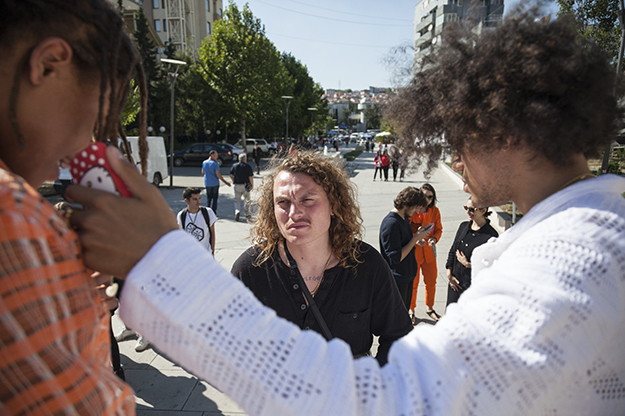
Bonne Reijn’s work with Flaka Jahaj had previously taken him to Zurich and now to Prishtina. Photo: Majlinda Hoxha / K2.0.
I saw her name and Googled her, and looked her up on Instagram, and I think I sent her a message saying “Thanks for buying.” She was maybe the first international customer, or one of the first. A year later she contacted me for a pop-up [store] in Zurich. I came with all my friends and we did a show with music and everything and it was lot of fun. From there we just kept in contact.
FJ: It was a very equal exchange, a mutual exchange, with respect and appreciation for each other’s work. When I first saw his suits, it was something I had been seeking for a long time. Something very straightforward and simple, without any fuss, just back to the essentials.
Obviously stitching is machine-made but I liked the philosophy of unisex. To me it was like someone had got a grip on questioning the system. Now it is kind of beautiful to get together here in Prishtina and show them where I am from and how it all started.
Would you say that there is worldwide trend of going back to traditions and incorporating them into fashion?
FJ: I think there is a big tendency and a big need for that. There are a lot of designers who also include handmade artisanal stuff in their work. It is common sense, everyone knows about the tragic conditions in the fashion business so they try to refocus and revalue old stuff rather producing new stuff.
It seems that for you Flaka, your Kosovar background and women’s dresses here and the women in your family had quite an impact.
FJ: My grandmother was pure tradition. She used to do home handworks and stuff so I learnt very early how to crochet and knit. That was really a precious gift because I didn’t inherit much, but I inherited these traditions and this knowhow, which was completely against my mom’s wishes for my future. She’s always said you cannot build a bridge with a yarn, that you cannot make a living out of it. So I am still fighting with her for recognition (laughs). Partly it is her fault as well, because she was always aesthetic, my father was aesthetic as well, so it runs in the genes I guess.
I learnt how to knit before I knew how to read and write. My grandmother was by the fire and I sat on her lap and she was knitting and she taught me how to knit.

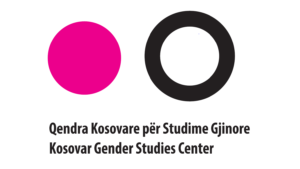 This publication has been produced with the assistance of the European Union, as part of a project implemented by Kosovo 2.0 and supported by
This publication has been produced with the assistance of the European Union, as part of a project implemented by Kosovo 2.0 and supported by